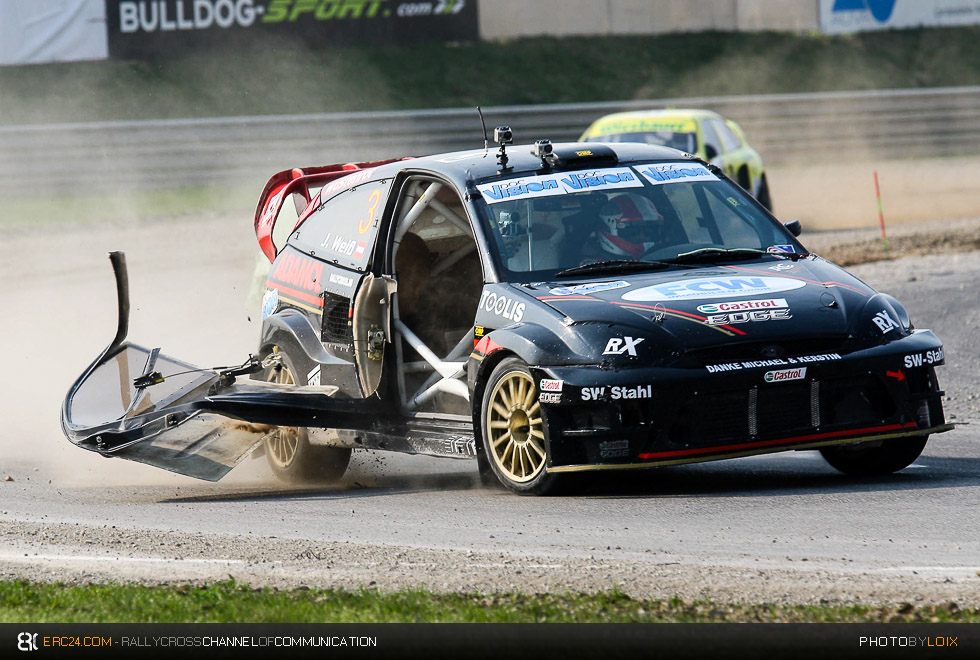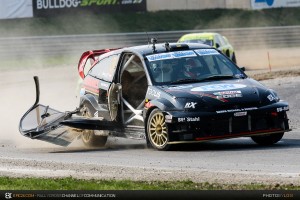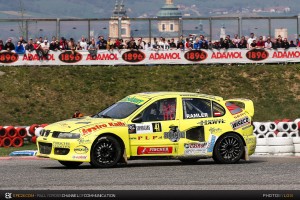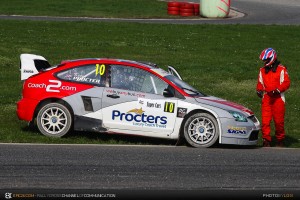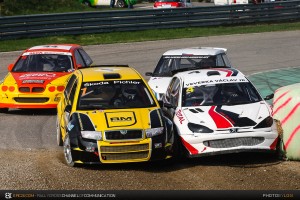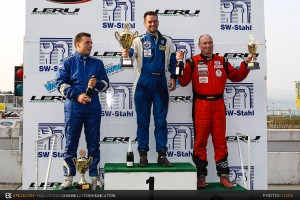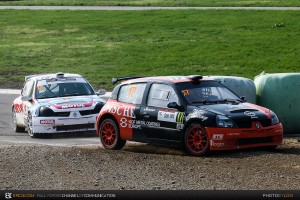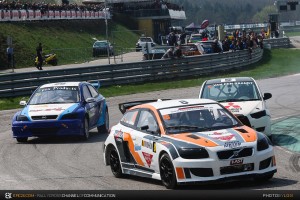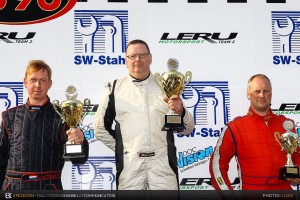Round 1 of the inaugural Rallycross Challenge Europe (RCE) was held at the Austrian Wachauring, where 40 years ago the first European Rallycross Championship round in history was won by 1973 ERC winner John Taylor.
On Easter Sunday, April 22 1973, the within just five weeks built Leruring near Melk in Austria saw its first ever Rallycross event. It was won by homeboy Harald Neger (Alpine A110) from the later triple European Rallycross Champion Franz Wurz (VW 1302S). A bit more than a week later, on Labour Day, May 1 1973, the first international Rallycross was held at the same venue. This time victory was claimed by Franz Wurz from Briton Rod Chapman (Ford Escort RS1600). Less than two weeks later it was again the Leruring that hosted the first ERC round in motorsport’s history. The winner of this inaugural European series, Scotsman John Taylor (Ford Escort RS1600), bagged his first 1973 round win on Sunday, May 13, at the so-called “Stiftswiesn” outside the little village of Pöverding.
The name of the Leruring was later changed several times, since 1997 it is called Wachauring [the Wachau is a valley formed by the river Danube, situated north-east of Melk and famous for its wine growing tradition]. However, in 2002 and 2003 the circuit was completely changed and turned into a track for so-called safer driving courses. As Franz Wurz was the inventor of these courses the father of former Formula 1 driver Alexander Wurz took care that a Rallycross track was also integrated in the new ‘Fahrtechnik-Zentrum Melk/Wachauring’. Last weekend, almost 40 years after hosting the first ever ERC round, the prestigious Rallycross track at Melk hosted the first round of the new Rallycross Challenge Europe.
Rallycross Challenge Europe opener
The kick-off of the new RCE series turned out to be somewhat ill-fated. After the likewise new RallycrossRX series had changed into reverse gear, opened the 2013 FIA European Rallycross Championship to all SuperCar drivers (originally the top class should have been limited to 16 and later 25 entries), offered to the Super1600 and TouringCar competitors to race on the Sundays too, and reduced their entry fee by over 50% (from €750 to €350), the previously higher interest in the Challenge dropped remarkabley.
Another problem was Melk. We understood that some of those drivers planning to take part in RCE events were not really keen to start in Austria. Perhaps it would have been a better idea to arrange a double weekend Melk and Sosnová, like Maasmechelen and Valkenswaard, to raise their interest? However, when Jos Kuijpers (due to illness of a team member), Jochen Coox (due to lost interest) and Robert Theuil (due to budget problems) pulled out of Melk at the eleventh hour the Austrian RCE event became a weak one. Seen the starting list the race looked rather like a well attended Austrian Rallycross Championship and Central European Zone round than an event counting for a new pan-European series that is meant to be an alternative to RallycrossRX…
Of course, Melk had a total of 81 starters while Lydden Hill had just 40. But considering that for both new series only the SuperCars, Super1600s and TouringCars are of importance Lydden had a higher quality line-up – and offered, with 40 vs 30 starters, also the better quantity. Nevertheless, the event at the Wachauring turned out to be a good one, attracting a for Melk huge crowd, and got a lot of positive response on social networking services like Facebook and Rallycross forums.
The top favourite of the SuperCars category was Kevin Procter, but the Ford campaigner had, right from the beginning, problems with his Focus Mk2. In the second qualifying heat the event was over for the Brit, his engine gave up and the man from Yorkshire had to throw in the towel. Similar situation with Ford Fiesta Mk7 driver Pavel Koutný who, after setting a second time in the first heat and a third fastest time in heat two, decided to quit. “In the beginning all went pretty well, but all of a sudden the engine produced a strange noise. We decided to withdraw from the event to avoid bigger damage”, told the Czech later.
Multiple Austrian champion Alois Höller claimed the pole position of the A final by setting the fastest times in the first and third heats. But after an argument with his arch-rival Peter Ramler in the first corner Höller spun his Ford Focus Mk1 into retirement. Thereby full advantage for Jürgen Weiß who drove his Ford Focus Mk1 to overall victory. Peter Ramler in the Seat Leon Mk1 became the runner-up to Weiß while Péter Kotán drove his Ford Escort Mk7 to third place. However, as his car is not homologated since the end of 2008 any longer the Hungarian cannot score Challenge points.
- FINAL RESULTS SUPERCARS:
- 1. Jürgen Weiß (A) Ford Focus Mk1
- 2. Peter Ramler (A) Seat Leon Mk1
- 3. Péter Kotán (H) Ford Escort Mk7 * Not eligible for RCE points.
- 4. Tristan Ekker (A) VW Polo Mk4/9N
- 5. Gerald Eder (A) Škoda Fabia Mk1
- 6. Matthias Schörgenhofer (A) VW Golf Mk5
- 7. Alois Höller (A) Ford Focus Mk1
- 8. Pavel Koutný (CZ) Ford Fiesta Mk7
- FINAL RESULTS SUPER1600S:
- 1. Klaus Freudenthaler (A) Škoda Fabia Mk1
- 2. Stanislav Šusta (CZ) Škoda Fabia Mk2
- 3. Eric Guillemette (F) Renault Clio Mk2
- 4. Ernestas Staponkus (LT) VW Polo Mk4/9N3
- 5. Sven Seeliger (D) Ford Fiesta Mk6
- 6. Václav Veverka Jr. (CZ) Peugeot 206
- 7. Pavel Vimmer (CZ) Škoda Fabia Mk1
- 8. Dorian Launay (F) Renault Clio Mk2
- FINAL RESULTS TOURINGCARS:
- 1. Jos Sterkens (B) Volvo C30/4 RWD
- 2. Louis de Haas (NL) Opel Astra G RWD
- 3. Ivo Van den Brandt (B) Mitsubishi Colt CZT RWD
- 4. Helmut Rössl (A) Škoda Fabia Mk1 RWD
